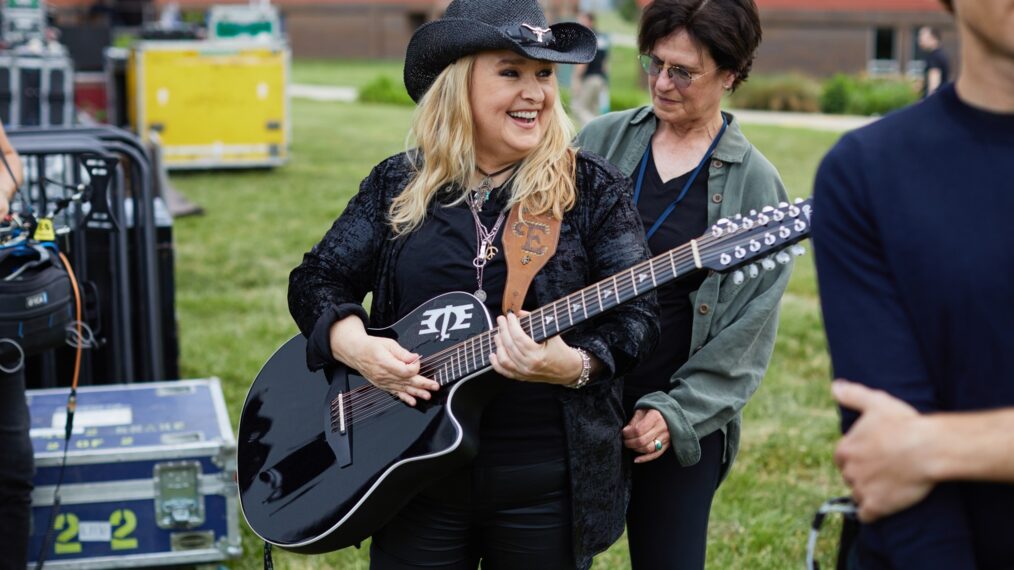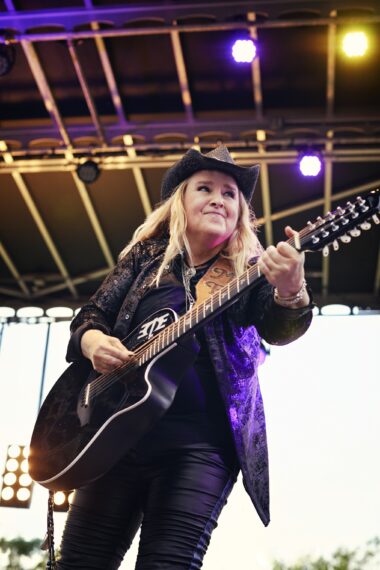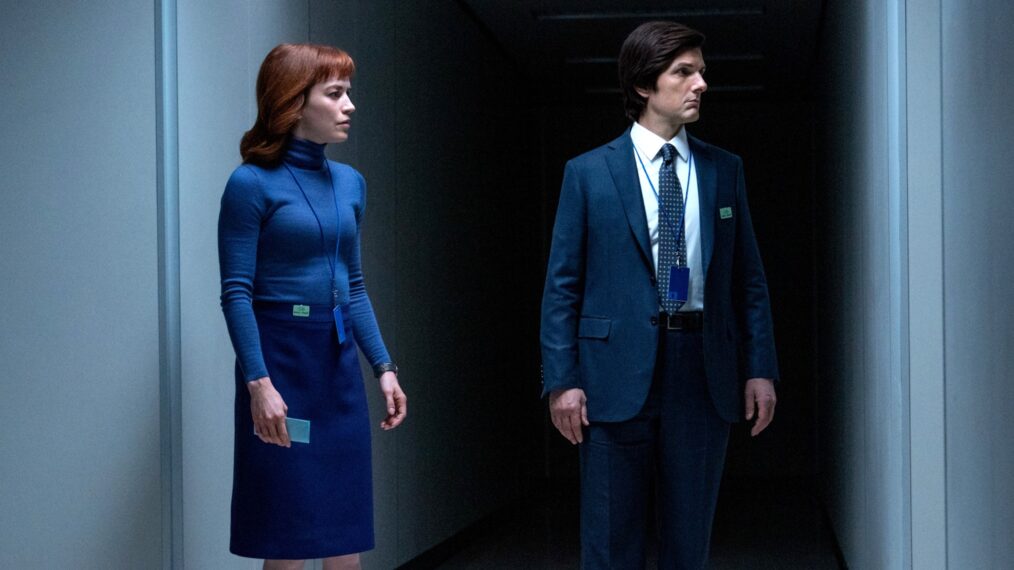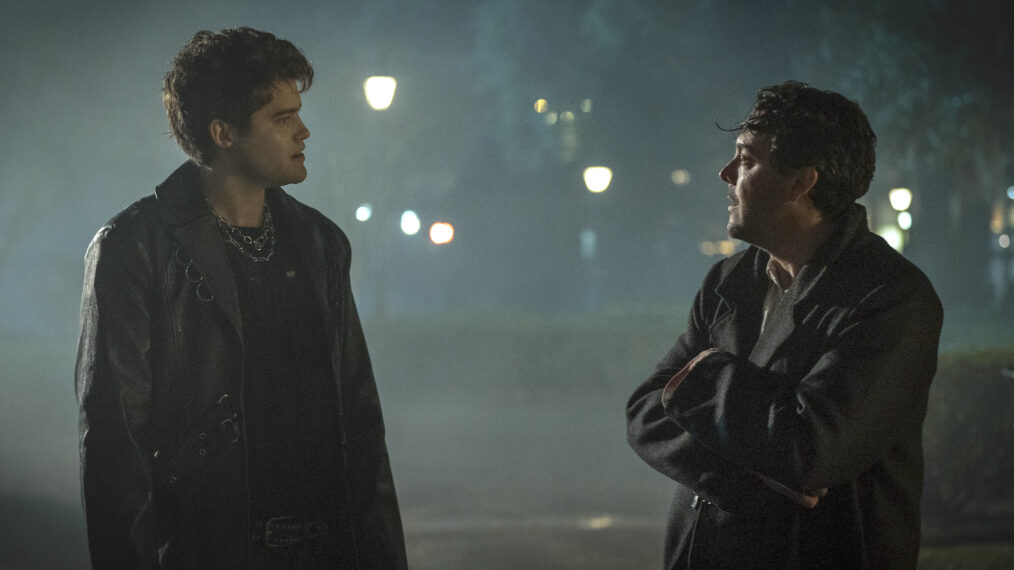I’m Not Broken’ Directors on How Singer Brings Music & Hope to Women’s Prison

Melissa Etheridge brings hope and music to the Topeka Correctional Facility in a powerful new two-part docuseries I’m Not Broken. The Grammy winner was touched by letters from residents of the women’s prison. Etheridge, who lost her son Beckett Cypher to opioids, connects with five from the facility and learns about their respective journeys including how they’ve battled addiction, generational trauma, and grief. The project also delves into how they’re healing and are working to find redemption while incarcerated.
Etheridge grew up a couple of blocks from the prison in Leavenworth, Kansas. The documentary chronicles the months leading up to a concert at the prison, which includes performing a song she wrote called I’m Not Broken. Before the premiere, we sat down with directors Brian Morrow and Amy Scott about the making of the powerful two-part film.

Paramount+
I know you’ve worked with Sheryl Crow before. What were your initial thoughts about this concept?
Amy Scott: Melissa had the idea and they really kicked the idea around during the lockdown…We immediately found it an exceptional project because it wasn’t just a bio piece. There was a gravity and depth to the story.
What kind of red tape did you have to go through to make this happen?
Brian Morrow: It was more difficult than a normal shoot. Our producer Jonathan Lynch really handled that. So much more of the filmmaking was done in preproduction than anything I’ve ever worked on. Months, or in some cases like the concert, a year was spent working to get in there for a few hours. The prison including the warden and others who worked on this were accommodating. It was just the bureaucratic process where things had to go all the way up to the Department of Corrections. Jonathan moved mountains to make it happen.
There are female prisoners there serving pretty lengthy sentences for things like intent to sell. For me, it’s pretty eye-opening to hear their stories and how they ended up there.
Amy: That is pretty soul-crushing. Then you take into account the kinds of offenses and the time sentenced. They are the primary caretakers, mothers, and grandmothers. You look at the big picture. That was one of the reasons we wanted to do this film. Other than Orange I the New Black, I really didn’t know the statistics of women’s incarceration in the United States. Knowing that and getting in here and talking to them one-on-one and learning their stories, it puts things in your own life in perspective.

James Moes/Paramount+
Was it difficult to get the inmates on camera to share and participate in the doc?
Brian: It was sensitive. We had to be sensitive with the way we handled it. There was nothing that was a surprise. Everything had to be approved ahead of time through different avenues. You sit down to hear what led to them being incarcerated…You see they are humans who made human choices like we all do and went down a bad path. I’m not saying let them off the hook for what they did, but it adds a whole dimension to it when you listen to someone’s story.
For everyone on our whole team, the film changed our lives to carry those stories with us. They had to be really trusting of us. It’s different than doing an interview with a big celebrity where they have people to protect them. We came into their space where they don’t have the freedom to come and go. I’m sure they felt really vulnerable. It was a mandate for us to make sure we weren’t being exploitative. I’m proud of what we did.
You also see through the doc that they are making the most of their time in there and using it in a positive way.
Amy: They are working through their sentence and time served, but they are ultimately working through their addiction. They think about how you come out when you are released and can rebuild their lives. That is what struck us. They are really spending their time looking inward and understanding their addiction and working through it.
How was it working with Melissa as she opened up about coping with the loss of her son? This project felt like three docs in one: a concert film, a biography, and doc about these women.
Amy: Thank you for saying that and seeing the film like that.
Brian: Thank you for understanding. We felt like we may have undersold the complexity we always meant to put into the project. Not just having to be a two-hour concert. In terms of the pressure of working with Melissa, it was more about time.. She keeps herself incredibly busy. She is always on the road. It’s trying to catch up with her here and there. This was also the tightest shooting ratio of any doc I know anyone has done. A lot times you have this ocean of footage you’re plucking stuff out of. It wasn’t like that here. There is barely anything on the cutting room floor. Everything we did with Melissa around her hometown, we did in one day. Consistently, we kept thinking about how would we get what we needed if we only had a few hours. And then she would just deliver. She would guide us. She is an incredibly dynamic person.
Amy: It was short bits with her, but it was over the span of a year. We were able to capture her in different places and wanted that feeling to come through. With what we did with Sheryl, there was nothing else going on in the world with the lockdown. We were so spoiled. She told us to come out and spend weeks on end, which we took her up on. This was such a difference. Melissa was extremely open with us. She became an immediate collaborator and shared in our vision. It was incredibly symbiotic.
Was the vision always to thread pieces of the concert through the doc?
Amy: We wanted that structure. We thought that was the strongest way to tell these multiple stories. Not everyone initially was on board with that. There was a little challenge to present the vision to the powers that be. It’s a hard sell to hit everyone with…It’s a heavy movie, so it’s a delicate balance.
Brian: The concert gives you a release valve of tension so we can help the audience go into the darker parts of the story without tuning out. You’re talking about generational trauma, abuse, addiction and loss. We were hoping to go into that feeling and then give you a chance to come out. The concert hopefully was that.
Amy: I want to give props to MTV and Paramount for even telling this story. It’s a hard sell. Telling this story took a lot of guts. We are super excited they even took a chance on this.
What kind of feedback have you gotten from Melissa and the residents?
Brian: She gave us great feedback. It’s really intense considering what she has been through and her loss. We wanted to make sure she was okay with it and that we did right by it. That was a huge relief when she reacted really positively. Corrections showed it to the five main residents involved in the film individually and gave them the space to talk it out. They found it so heartwarming and positive. They said the film treated them like real people. They liked the way they looked. That Melissa was so real and understood them. All these really positive things. I wanted to make sure we did right by them. That was a huge relief they felt that way. It was nice for the people at the prison to be conscious of them and give them the space to process it.
If you or someone you know has addiction issues, contact the Substance Abuse and Mental Health Services Administration‘s National Helpline at 1-800-662-HELP (4357). If you or a loved one are in immediate danger, call 911.
Melissa Etheridge: I’m Not Broken premiere, July 9, Paramount+
Read the original article here






